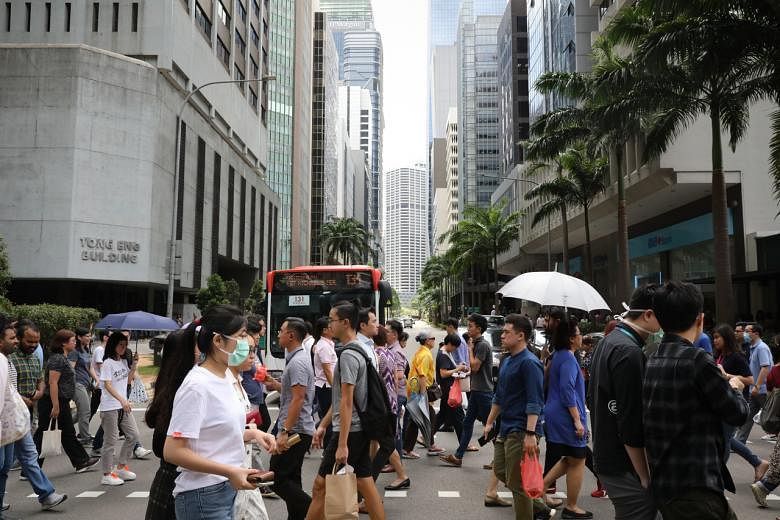SINGAPORE - The uncertainty brought about by the coronavirus outbreak means it will be a challenge for unemployment to remain in the relatively low range seen in recent years, said Manpower Minister Josephine Teo.
She also cautioned on Tuesday (March 3) that going forward, it would be unrealistic to expect employment growth to be at the same level as in the past few years.
The Government's first priority is to prevent large-scale job losses and prevent a scaling back or reversal of wage increases for low-wage workers, she told the House.
At the same time, it must not neglect future challenges, she added.
Mrs Teo noted that despite economic headwinds, employment growth last year was better than expected. Since 2015, employment outcomes for Singaporeans have been "very positive overall", she added.
But the outlook for this year has become very uncertain, she said, adding: "These unfavourable conditions demand a united response from all of us."
This is why the bulk - 60 per cent - of the $4 billion Stabilisation and Support Package announced by Deputy Prime Minister Heng Swee Keat last month goes towards job support and wage credits, she said.
At the same time, efforts are ongoing to help businesses transform, continue creating good jobs and raise wages at the lower end, as well as help Singaporeans adapt to changing job requirements brought about by technology.
HELPING WORKERS UPSKILL
Mrs Teo said the Government is investing about $1 billion to boost the employment prospects of Singaporeans over the next five years, through the SkillsFuture Mid-Career Support Package, SkillsFuture Enterprise Credit and enhanced Productivity Solutions Grant.
"These are a clear commitment to ensure Singaporeans have fair opportunities to progress at every stage of their working lives," she said.
Last year, more than 31,000 local job seekers were placed in jobs through the Adapt and Grow initiative, a similar number to that of 2018.
More than half of those placed were aged 40 and above, and nearly a third were aged 50 and above.The share is even higher for rank-and-file workers.
Elaborating on the support for mid-career Singaporean workers in their 40s and 50s, Mrs Teo said many of them would hope the time they invested in training leads to a job.
This is why many programmes are in the place-and-train format, where workers are hired based on their existing experience, and go for additional training to close the skills gap.
Since 2016, place-and-train schemes such as professional conversion programmes have helped nearly 14,500 Singaporeans, she added.
In the last two years, more than 2,000 professionals, managers, executives and technicians (PMETs) were also reskilled and redeployed within the same companies before they became redundant, she said in response to Mr Patrick Tay (West Coast GRC).
The ministry aims to double the number of mid-career workers who enter new jobs through reskilling programmes to around 5,500, by 2025, she added.
Mrs Teo said the Government will also ramp up train-and-place programmes, which do not require employers to commit to hiring trainees upfront, but equip participants with in-demand skills so they have a good chance of getting a job after training.
Although Singapore does not have unemployment insurance, she noted that all participants on place-and-train programmes receive full salaries or allowances, which supports unemployed people who are prepared to undergo reskilling.
A pool of volunteer career advisers will also be built up to complement the host of different job-matching and career-coaching programmes offered by government agency Workforce Singapore, NTUC's Employment and Employability Institute, the five community development councils, sector agencies and institutes of higher learning.
SUPPORTING EMPLOYERS
In terms of supporting employers, the Government's priority is to bring down the cost of recruiting and training mid-career job seekers, said Mrs Teo.
From April 1, the Government will raise salary subsidies for all workers aged 40 and above on place-and-train programmes to 90 per cent, up from 70 per cent.
DPM Heng had already announced a hiring incentive for bosses who hire workers aged 40 and above through reskilling programmes, which covers 20 per cent of the new worker's monthly salary for half a year, capped at $6,000 in total.
The Productivity Solutions Grant will also be enhanced to provide up to 70 per cent funding for companies to engage job redesign consultants to ensure jobs are more attractive, especially to mid-career and senior workers, said Mrs Teo.
Most of the remaining 30 per cent out-of-pocket costs can be paid using the new $10,000 SkillsFuture Enterprise Credit, which was announced during the Budget.
For companies with a clear plan to transform their business, MOM will consider allowing them to hire additional workers during a transition period, said Mrs Teo.
Nominated MP Douglas Foo had flagged concerns from workers and bosses about setting aside time for training - employees worry about having to deal with a large backlog of work when returning after training, while employers have to juggle limited resources.


